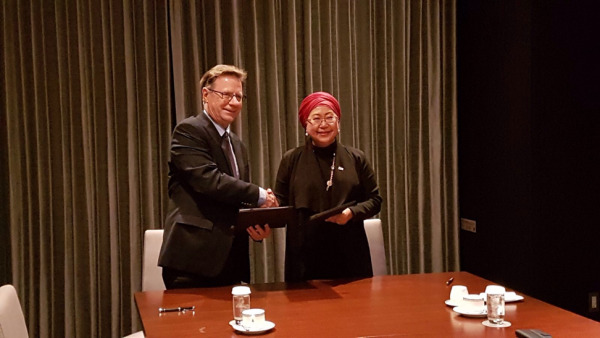APRU Multi-Hazards Program advances disaster risk reduction and management by partnering with Elsevier and the International Federation of Red Cross and Red Crescent Societies (IFRC) at the inaugural World Bosai Forum to demonstrate the impact of a regional, trans-sector and multi-level approach to disaster science.
Sendai, Japan, November 26, 2017—APRU’s Multi-Hazards Program joined the International Federation of Red Cross and Red Crescent Societies (IFRC) and Elsevier to advance the Sendai Framework for Disaster Risk Reduction (DRR) at the inaugural World Bosai Forum.
The World Bosai Forum is part of Japan’s commitment to implementing the Sendai Framework, which bridges the gap between DRR research and ground-level implementation.
APRU seeks to address this research–implementation issue by acting as a “super-connector” between organizations, networks, and governments at various levels. The approach is demonstrated by its various initiatives, such as the Multi-Hazards Program.
APRU most recently signed an MOU with the IFRC at the World Bosai Forum. The move builds upon activities by the Program, and signals the beginning of joint-efforts to move beyond research and pursue DRR advocacy. The organizations will advocate in relevant forums such as the Asian Ministerial Conference on DRR.
The IFRC and APRU agreed to support cross-sector research with the aim to put disaster science to work and into practice.
At the Forum, APRU and its Multi-Hazards Program contributed to two key sessions.
A panel discussion hosted by Tohoku University and APRU showcased examples of how research networks are reaching out to corporate and government actors to further DRR. Complex issues like DRR often demand complex responses, requiring input from actors across levels and sectors for a workable solution.
Additionally, during the Forum’s opening plenary session (pictured above), Elsevier unveiled its report, A Global Outlook on Disaster Science. The report describes how developing regions in Asia suffer greater economic losses as well as loss of life from natural disasters. Despite greater losses from natural disasters, many developing Asian countries also publish fewer disaster science papers, the report finds.
During the plenary session, Christopher Tremewan, APRU Secretary General, highlighted the need for research universities to engage stakeholders at all levels, across all sectors, while Dr. Jemilah Mahmood, Under Secretary General of the IFRC, appealed to evidence-based actions. She emphasized the importance of research capacity and data literacy in putting disaster science research into action.

APRU Secretary General Christopher Tremewan signs MOU with Under Secretary General Jemilah Mahmood of the International Federation of Red Cross and Red Crescent Societies (IFRC) during the World Bosai Forum in Sendai, Japan.
For more information, please click here to see the highlights of the Forum by IRIDeS, Tohoku University.
